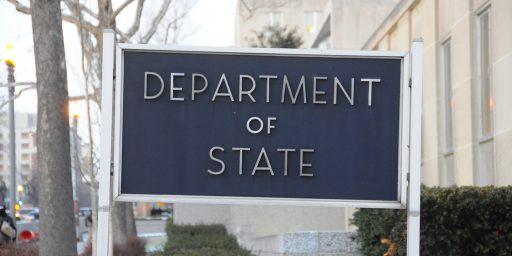Plagiarism Plague in Russia
Via Slate: The Craziest Black Market in Russia. Apparently, a lot of Russians are paying for dissertations:
In the past few years alone, there have been credible allegations of dissertation plagiarism made against Russia’s minister of culture, the governor of St. Petersburg, and the head of the country’s top federal investigating authority. Just in the past month, copy-and-pasting has been discovered in the dissertations of the deputy finance minister of the Russian republic of Mordovia and a government adviser on justice who is the putative author of a thesis comparing legal principles in Russia and the West.
[…]
Quantifying the scale of Russia’s plagiarism problem is difficult, but based on the data it has collected so far, Dissernet estimates that improper borrowing can be found in about 4 percent of all dissertations defended in the country. That doesn’t include ghostwritten work that is plagiarism-free: According to Ararat Osipian, who completed a Ph.D. on academic corruption at Vanderbilt University and is now doing field work on the subject in Ukraine, between 20 percent and 30 percent of all dissertations that have been completed at Russian universities since the fall of the Soviet Union were purchased on the black market.
This market feeds on the Russian elite’s surprisingly intense yearning for the markers of academic status. According to Parkhomenko, Russian bureaucrats, lawmakers, doctors, and businesspeople regard advanced degrees as part of the same “package of success” as expensive jewelry, fancy cars, and giant homes. “If a person has achieved this—if he could get himself this title, it is supposed to mean he is capable of something in life,” Parkhomenko said. “It means he’s worthy of respect.”
The system:
The prevalence of academic fraud in Russia is fueled in part by the structure of the country’s higher education system. Unlike their American counterparts, would-be academics in Russia can receive doctoral degrees without doing any substantial coursework, as long as they convince a “dissertation board” to approve their theses. These dissertation boards exist inside universities, where they are organized by discipline and staffed by faculty members; there are several thousand of them throughout the country. “If it’s a big university, they might have 10 of these boards, each one devoted to a different academic field—one for European history, one for Russian history, one for philology, one for French language, one for philosophy, and so on,” said Parkhomenko.
Over the past 25 years many of these boards have become corrupt, with faculty members and academic advisers taking bribes in exchange for rubber-stamping obviously shoddy, or stolen, work, according to Osipian, who is not a member of Dissernet. “Everyone wants to get his cut,” he said. “You bought a dissertation, fine, but you still have to pay the people on the board to let this dissertation go through. At these universities, everyone needs money—they are all overworked and underpaid.”
Corrupt dissertation boards, according to Zayakin, are the “core” of the supply chain for academic fraud, and some of them “have effectively become places where fake degrees are manufactured.” But what really makes the system hum is the thriving marketplace of dissertation-writing firms, which often masquerade as mere academic consultancies, that broker deals for buyers. For the most part, these firms do their business out in the open and are easy to find by looking up “dissertation for order” on Google or the Russian search engine Yandex.
A key component that contributes to this process is the lack of coursework for a doctorate, which places all the entirety of the burden of proof on the dissertation. Quite frankly if the article is correct in that description, it raises question in my mind about the general quality of a Russian doctorate in comparison to one earned in the US which typically included multiple years of coursework plus either fieldwork of some kind or substantial lab-based research.
At any rate, the whole thing is worth a read, and does describe a depressing (and staggering) amount of corruption.






Oh, hell, someone has to post the link…
On a more serious note, the same situation, but not using the same processes at all, was a serious concern in Korea while I was there. It seemed to be driven by the same desires and assumptions about status, too.
@Jenos Idanian: Tom Lehrer is fantastic.
@Just ‘nutha ig’rant cracker: It is a real problem.
@Steven L. Taylor: Ironically enough, the Tom Lerher bit (which I will agree is fantastic) was, how shall I put this… adapted–yeah that’ll work– from a production number in a Danny Kaye movie . I think the movie was The Inspector General, but I’m too lazy to look it up.
Ah, if only.
I’ve recently been involved in a lot of hiring interviews of PhD economists. It turns out that economists don’t do anything like what I would call a ‘dissertation’ any more. Instead, they produce ~3 papers for publication on a vaguely related topic, and bundle them as a ‘dissertation’ with a title like “Topics in resource economics”. None of the papers has anything like the depth or breadth of research — or the scrutiny — that I associate with a typical dissertation in science or engineering.
We recently had a candidate with fabulous credentials — about to get his PhD from perhaps the top economics program in the country (depending on who you ask) — who turned out to have thrown out about 2/3 of his data in the dimension of analysis as ‘outliers’. When we called his advisers to ask about this, it was very clear that (a) they had not actually read the paper, and (b) they were really, really embarrassed.
So, things might be explicitly corrupt in Russia, with PhDs for sale, but the US is not the bastion of academic rigor that we might want it to be.
@Just ‘nutha ig’rant cracker:
IIRC, Lehrer said openly that the Lobachevsky song was inspired by Danny Kaye’s ‘Stanislawski’ routine, which is not from The Inspector General but was part of Kaye’s stage act.
If I will take a bribe to sign off on a bogus dissertation, surely I would accept an even smaller bribe for a decent grade in my class that you never attended…
@DrDaveT: Yes, I have seen that “three papers” thing, of which I have some skepticism. And I can think of programs whose exit requirements aren’t that impressive. Still, we are talking here about an anecdote versus systematic corruption and that for all the flaws in our system, I still think it is the best in the world.
And in regards to bribing for classes: sure, but my point was even one did the non-corrupt version, it still meant a lot less work that your typical US Ph.D.
Whereas here in the U.S., we have those places that provide Ph.Ds I exchange for a bundle of cash and “lifetime experiences”
@Grumpy Realist: Indeed. But if one know what one is looking at, one ought to know those are bogus. But, it is also true that along with the prestige angle of the Russia example, a lot of people don’t know what they are looking at.
@DrDaveT: Thanks for the correction; I remembered that it was from something that Danny Kaye did, just not what.
@Steven L. Taylor: While I was in Korea, I encountered ESL teachers who were doing “doctoral research” on prepositional phrases and the utility of using Facebook as a communication tool for collaborative research.
If only I’d known 10 years earlier… (sigh)
@Steven L. Taylor:
I don’t actually disagree with that — though I do think that eternal vigilance is the price of credibility.
FWIW, my ‘anecdote’ now extends to roughly 400 impending PhDs from top-20 programs over the past 5 years. None of them have done anything for their ‘dissertation’ that requires any more depth or thoroughness than is required to publish a paper in a top journal — which is itself a moving target — and few of them* have had close hands-off supervision by their dissertation committee. What fraction of them have done something egregious? Nobody knows.
*guess based on nonrandom sample of the ones we’ve followed up on
@DrDaveT:
I 100% agree.
When I referred to the anecdote, I meant the lack of supervision. I understand about the three papers=dissertation thing and I share your reservations.
@Steven L. Taylor: That’s what’s called a “ronbun hakase” in Japan. Staple a bunch of papers together that you’ve done (little or no coursework) and presto, you’ve got a Ph.D.
I did a huge report for the Japanese government analyzing the differences between the US and Japanese graduate systems in science and engineering.
The major benefit one gains from the US system is that by the time you’re kicked out at the other end with your Ph.D., you’ve experienced all the stuff that you are going to need as a professor: teaching, hunting down money for your research….